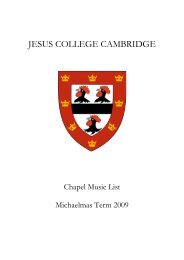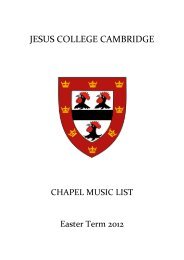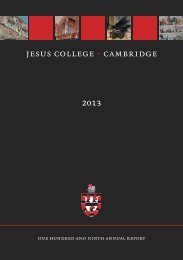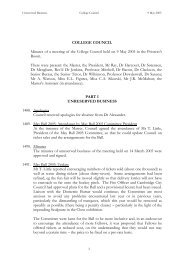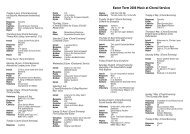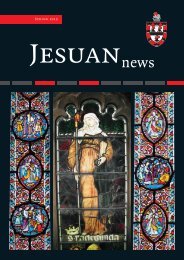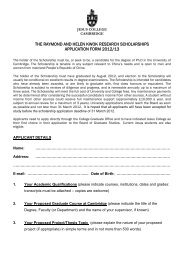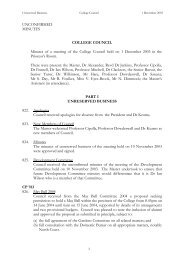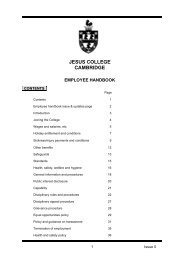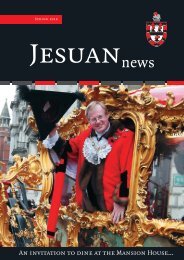2012 Annual Report - Jesus College - University of Cambridge
2012 Annual Report - Jesus College - University of Cambridge
2012 Annual Report - Jesus College - University of Cambridge
Create successful ePaper yourself
Turn your PDF publications into a flip-book with our unique Google optimized e-Paper software.
OBITUARIES I <strong>Jesus</strong> <strong>College</strong> <strong>Annual</strong> <strong>Report</strong> <strong>2012</strong> 123<br />
A proposal to make the work <strong>of</strong> the Research Councils more related to National needs,<br />
while retaining their independence, led to the controversial “Customer-Contractor”<br />
principle. This involved relevant Government Departments appointing Chief Scientist<br />
Advisors to help them to commission research from the Research Councils, and transfer<br />
<strong>of</strong> some funds from the Research Councils to the Departments. Alan commented that<br />
this scheme attracted an enormous correspondence which rapidly filled his filing<br />
cabinet.<br />
Alan was not very comfortable with the machinations <strong>of</strong> Whitehall politics. He played<br />
straight, and used his powerful intellect to make his case, however unpopular.<br />
In 1974, in evidence to the Select Committee on Science and Technology, Alan<br />
expressed his concern about the integrity <strong>of</strong> the steel reactor pressure vessel, which is<br />
critical to the safety <strong>of</strong> the Pressurised Water Reactor, promoted by Walter Marshall, for<br />
our Civil Nuclear Programme. This caused quite a stir. Walter Marshall set up a High<br />
Level Pressure Vessel Committee which examined the issue in great detail. In the early<br />
1980s, following the Marshall <strong>Report</strong>, Alan said that he was now satisfied that a<br />
sufficiently robust safety case could be established. The report and Alan’s endorsement<br />
had a major impact on the Sizewell B enquiry and on getting Nuclear Installation<br />
Inspectorate approval, and led more generally to major advances in the requirements for<br />
ensuring the integrity <strong>of</strong> pressure vessels and other large safety critical structures.<br />
In 1974 Alan accepted an invitation to become Master <strong>of</strong> <strong>Jesus</strong> <strong>College</strong>, <strong>Cambridge</strong>.<br />
He was glad to return full time to his family and to academic life. Alan had to supervise a<br />
major revision <strong>of</strong> the <strong>College</strong> Statutes and prepare for the admission <strong>of</strong> women. This<br />
proved a great success. As Master, Alan came to know Prince Philip. Through Alan’s<br />
encouragement, Prince Edward became an undergraduate at <strong>Jesus</strong>.<br />
In 1977 he became Vice Chancellor for two years. He was surprised by the amount<br />
behind the scenes work that was needed, dealing with grievances and settling disputes.<br />
There was a lot <strong>of</strong> entertaining that had to be done and the Chancellor, Prince Philip,<br />
stayed in the Lodge. Much <strong>of</strong> the responsibility fell on Jean, who managed it superbly and<br />
with much pleasure.<br />
On returning full time to <strong>College</strong> his main activity was preparing for the arrival <strong>of</strong><br />
Prince Edward who became an undergraduate in the <strong>College</strong>.<br />
In 1986 Alan retired. He returned to the Department, and researched a new topic:<br />
The application <strong>of</strong> modern electron theory <strong>of</strong> metals to metallurgical problems, such as<br />
embrittlement <strong>of</strong> metals by certain impurities. Alan mastered the quite difficult theory<br />
and published in 1988 an excellent book Introduction to the Modern Theory <strong>of</strong> Metals. This<br />
was followed by an impressive set <strong>of</strong> papers and the publication <strong>of</strong> a book on Chemical<br />
Bonding in Transition Metal Carbides.<br />
In early 1996 Jean fell ill with Parkinson’s disease. Alan looked after her full time, so<br />
that she could stay at home. Sadly, she died in 1999 and Alan was devastated, and only<br />
got through it by strong family support. But he missed her greatly, and never really got<br />
over her loss. During this period he also became very deaf and this ended his enjoyment<br />
in music and lectures. Nevertheless, he continued publishing on plasticity <strong>of</strong> metals<br />
during the last few years.<br />
Alan was the most outstanding and influential Physical Metallurgist <strong>of</strong> the twentieth<br />
century. Through his pioneering researches, and as an educator, he has influenced<br />
countless students, scientists, and engineers over the years and will continue to do so.<br />
His papers and books are remarkable for their clarity. In his researches, he always knew<br />
what important questions to ask, and how to answer them. He had a brilliant intellect<br />
which he retained to the end. Alan was a kind, gentle, and sensitive person, with a sense<br />
<strong>of</strong> humour, and very supportive <strong>of</strong> people. He loved his family and was proud <strong>of</strong> Ge<strong>of</strong>frey



